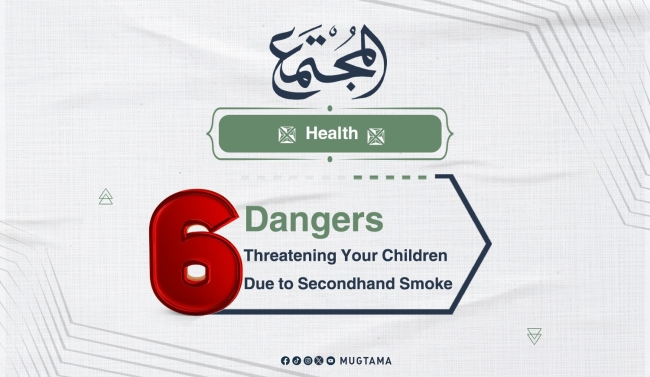Many parents make a grave mistake when they smoke near their children and wives at home or during meals, ignoring the dangers of secondhand smoke to their health and its potential to cause serious illnesses.
A father might be a heavy smoker, consuming up to 20 cigarettes a day or more, which increases the risk of his children developing cancer, even if they have never smoked a single cigarette. This is according to a medical study published by the German Cancer Research Center.
These lines serve as a warning bell for every father about the dangers of smoking in general, and particularly inside the home and around children and the mother. This practice significantly increases health risks for everyone, passing the harm to other family members.
First: Smoking is harmful to health and a waste of money. The Prophet Muhammad (peace be upon him) warned us: "There should neither be harming (of others without cause), nor reciprocating harm (between two parties)" (Narrated by Ahmad). This principle forms the basis for prohibiting anything that harms a person, whether it be food or drink. This includes alcohol, narcotics, tobacco, hookahs, and electronic cigarettes, among other harmful substances.
It is also authentically reported that the Prophet (peace be upon him) said: "Allah hates that you engage in gossip, asking many questions about people’s affairs and wasting wealth" (Narrated by Al-Bukhari). Wasting money includes smoking, which consumed over $250 billion of the global economy in 2022. It is projected that spending on the tobacco industry worldwide will reach $287.09 billion by 2026, with an annual consumption of tobacco products nearing 5 trillion cigarettes, according to data from the "Tobacco Atlas" center.
Second: Every smoking father should know that one person dies every 4 seconds worldwide because of smoking. Fifteen people lose their lives every minute due to tobacco, and smoking was responsible for the deaths of approximately 9 million people in 2019, according to a study published in The Lancet, one of the world's leading medical journals.
A study by the German Federal Center for Health Education revealed that secondhand smoke increases children's risk of asthma, pneumonia, and bronchitis. In general, smoking causes numerous harms, including heightened risks of heart disease, strokes, lung cancer, throat and mouth cancers, gum disease, tooth decay, and even infertility.
Third: Parents must understand that children breathe more than adults, especially infants and toddlers, which raises the risks of secondhand smoke exposure due to their underdeveloped respiratory systems and immune systems. A child inhaling pollutants in a smoke-filled room for an hour is equivalent to smoking a cigarette, according to the German Press Agency (dpa).
Fourth: Some people, particularly in rural areas, mistakenly believe that smoking hookah (shisha) is less harmful than cigarettes. They ignore scientific facts showing that one session of hookah smoking equals 55 cigarettes, or approximately three packs. The World Health Organization states on its website that hookah smoke contains large amounts of toxic substances causing cancer, particularly cancers of the mouth, esophagus, and lungs, as well as possibly the stomach and bladder. There is also evidence linking hookah smoking to respiratory diseases, heart conditions, gum disease, rhinitis, and male infertility.
Fifth: A father may switch to electronic cigarettes, thinking they are less harmful. However, experts warn that e-cigarette vapor contains pollutants such as formaldehyde and acetaldehyde, which are carcinogenic. These substances not only endanger the smoker but also his children, according to Professor Hans-Jürgen Nentwich, a member of the expert committee of the German Professional Association of Pediatricians and Adolescents.
Sixth: Cold tobacco smoke, consisting of tiny particles that settle on furniture, carpets, or clothing, is equally harmful. These particles can move through air currents, posing health risks even when children are not present during smoking. Scientific studies warn that nicotine in cigarettes can react with other environmental substances to form carcinogens. This reiterates the overall dangers of smoking in all its forms, whether inside or outside the home, as its harm extends beyond the smoking father to affect the wife, children, and even grandchildren.
-------------------------------------------------------------


